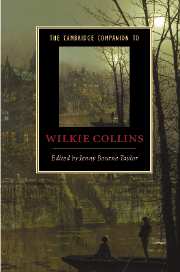Book contents
- Frontmatter
- Introduction
- 1 Collins’s career and the visual arts
- 2 The early writing
- 3 Collins’s shorter fiction
- 4 Collins and the sensation novel
- 5 The Moonstone, detective fiction and forensic science
- 6 The later novels
- 7 The professional writer and the literary marketplace
- 8 The marriage plot and its alternatives
- 9 Collins and Victorian masculinity
- 10 Collins and empire
- 11 Disability and difference
- 12 Collins and the theatre
- 13 The afterlife of Wilkie Collins
- Further reading
- Index
- Series List
Introduction
Published online by Cambridge University Press: 28 January 2007
- Frontmatter
- Introduction
- 1 Collins’s career and the visual arts
- 2 The early writing
- 3 Collins’s shorter fiction
- 4 Collins and the sensation novel
- 5 The Moonstone, detective fiction and forensic science
- 6 The later novels
- 7 The professional writer and the literary marketplace
- 8 The marriage plot and its alternatives
- 9 Collins and Victorian masculinity
- 10 Collins and empire
- 11 Disability and difference
- 12 Collins and the theatre
- 13 The afterlife of Wilkie Collins
- Further reading
- Index
- Series List
Summary
Wilkie Collins was a popular and prolific novelist whose career spanned most of the second half of the nineteenth century. It began in 1850, when Charles Dickens, William Makepeace Thackeray and Charlotte Brontë were at the height of their powers and George Eliot was still to publish a work of fiction, and ended in 1890, as the Victorian novel itself was drawing to a close, in the era of Thomas Hardy, H. G. Wells, Rudyard Kipling and George Gissing. Collins published more than twenty novels, numerous short stories and perceptive and witty pieces of journalism. He collaborated closely with Dickens during the 1850s and 1860s and was involved with Dickens in dramatic productions as well as adapting his own work for the stage. He was a busy and hard-working professional writer who negotiated a rapidly changing literary marketplace and was able to make use of new forms of publication and distribution of fiction at both national and global levels.
Collins's popularity as a compelling storyteller, a 'master of suspense' who inaugurated the sensation novel and played a key role in shaping detective fiction has remained undiminished. Andrew Lloyd Webber's musical version of The Woman in White played to packed audiences in London's West End during 2005, and Sarah Waters's novel Fingersmith, which reworks Collins's signature themes of deception and substitution, was shortlisted for both the Man Booker and the Orange prizes in 2003. Meanwhile, in contemporary criticism Collins's reputation has moved from the margins to the mainstream.
- Type
- Chapter
- Information
- The Cambridge Companion to Wilkie Collins , pp. 1 - 6Publisher: Cambridge University PressPrint publication year: 2006
- 2
- Cited by



